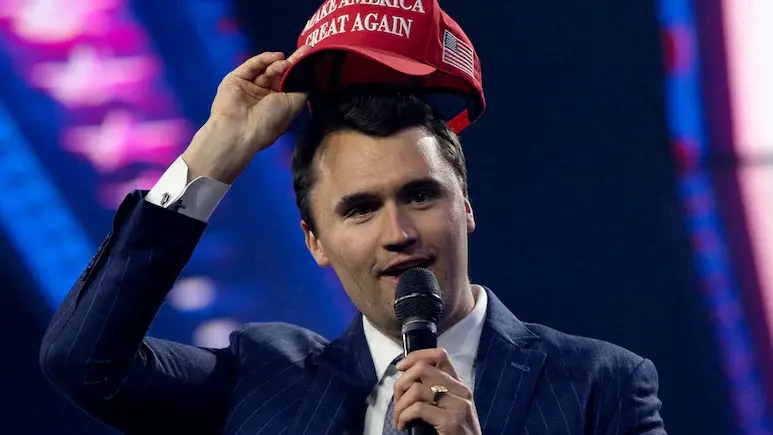
Charlie Kirk’s anti-India visa tweet sparks backlash before his assassination
Charlie Kirk Anti-India Rant Sparks Outrage – Just days before his shocking assassination in Utah, conservative US activist Charlie Kirk ignited a firestorm with a controversial statement: “America does not need more visas for people from India. We’re full. Let’s finally put our own people first.” His remarks, posted on X (formerly Twitter), triggered widespread backlash from Indian-American communities, tech leaders, and immigration advocates.
Kirk’s death has now cast a dramatic shadow over the already heated debate on legal immigration, outsourcing, and the future of US-India relations. Let’s unpack what happened, why it matters, and how it could reshape global conversations on migration and merit.
What Did Charlie Kirk Say and Why It Sparked a Storm
Charlie Kirk, 31, was a prominent conservative figure and close aide to President Donald Trump. Known for his hardline views on immigration, race, and culture wars, Kirk had built a massive following through his podcast and youth organization, Turning Point USA.
On September 2, Kirk posted:
“America does not need more visas for people from India. Perhaps no form of legal immigration has so displaced American workers as those from India. Enough already. We’re full. Let’s finally put our own people first.”
His comments were a direct response to speculation that a U.S.-India trade deal might include expanded visa quotas for Indian professionals. Kirk framed the issue as a zero-sum game, suggesting that Indian workers were taking jobs from Americans.
Why It Backfired
- Indian professionals are key contributors to U.S. tech, healthcare, and education sectors.
- Many Indian immigrants pay billions in taxes and support local economies.
- The H-1B visa program, often criticized by conservatives, is vital for Silicon Valley and research institutions.
- Kirk’s remarks were widely condemned as xenophobic and misinformed.
Indian-American advocacy groups called the statement “divisive,” while industry leaders warned it could damage bilateral ties and push skilled workers toward more welcoming countries.
The Tragic Turn: Kirk’s Assassination and Its Fallout
On September 10, Kirk was fatally shot during a public event at Utah Valley University. The incident, described by Utah’s governor as a “political assassination,” sent shockwaves across the U.S. political landscape.
What Happened
- Kirk was speaking at an outdoor gathering when gunfire erupted.
- He was struck in the neck and died shortly after being rushed to the hospital.
- The shooter remains unidentified, though two suspects were briefly detained and released.
- President Trump mourned Kirk as a “patriot” and “martyr for truth,” vowing to hunt down those responsible.
The timing of Kirk’s death so soon after his inflammatory remarks has fueled speculation about motive, political violence, and the dangers of polarizing rhetoric.
Immigration, Outsourcing, and the India Debate in America
Kirk’s comments didn’t emerge in a vacuum. They reflect a growing chorus of conservative voices questioning the role of Indian professionals in the U.S. economy.
The Core Issues
- H-1B Visa Criticism: Conservatives argue it displaces American workers, especially in tech.
- Outsourcing Backlash: Far-right figures like Laura Loomer have called for bans on Indian call centres.
- Trade Deal Tensions: Some fear that visa concessions to India could hurt U.S. labor markets.
However, data from the American Immigration Council shows that immigrant and native-born workers often complement each other. Indian professionals are overrepresented in STEM fields, contribute to innovation, and help fill critical skill gaps.
India’s Response
While the Indian government has not officially commented on Kirk’s remarks, Indian-American lawmakers like Ro Khanna have warned against letting “Trump’s ego destroy a strategic relationship with India”.
What This Means for US-India Relations and Global Migration
Kirk’s death and the controversy surrounding his remarks have reignited debates about immigration, nationalism, and diplomacy. For India, the episode is a reminder of how deeply intertwined its global workforce is with American politics.
Key Takeaways
- Polarization Is Rising: Immigration is no longer just a policy issue, it’s a cultural flashpoint.
- Indian Talent Is Under Scrutiny: Despite their contributions, Indian professionals face growing hostility in some U.S. circles.
- Diplomatic Sensitivity Is Crucial: Trade deals, visa quotas, and public statements can quickly escalate into international incidents.
- Public Opinion Matters: The backlash against Kirk shows that anti-India rhetoric won’t go unchallenged.
Charlie Kirk Anti-India Rant Tweet, A Tragedy and A Tipping Point
Charlie Kirk’s tweet may have been just one post in a sea of online noise but its impact was seismic. It exposed deep divisions in American society, challenged the role of Indian professionals, and ended in a tragedy that stunned the nation.
As the U.S. grapples with political violence and immigration reform, and India watches closely, one thing is clear: the debate over visas is no longer just about paperwork, it’s about identity, opportunity, and the future of global cooperation.
Also read: The Tragic Death of Charlie Kirk: A Shot That Shook the Nation
Stay informed with the latest news and updates – only on Rapido Updates.